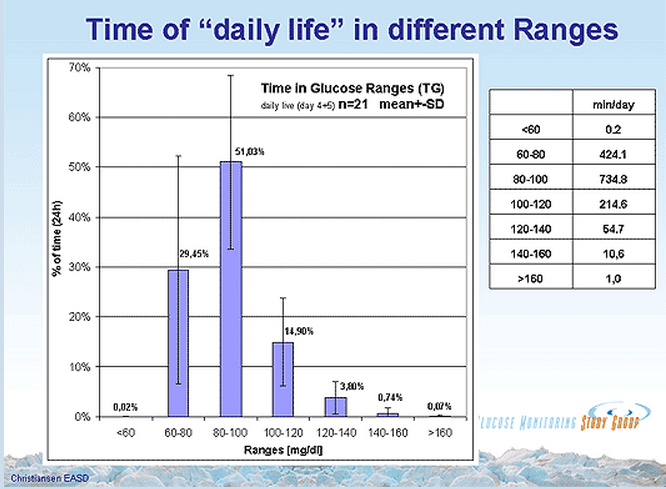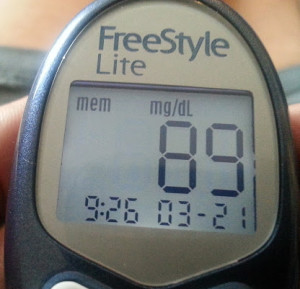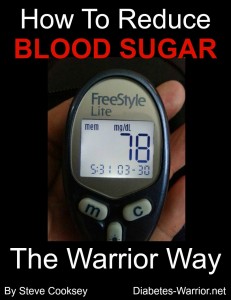My blood sugar goals: truly normal blood sugars. In other words, normal blood sugar for non-diabetics. It’s common sense right? Who would want ab-normal blood sugar levels? The devil is in the details.
- What are truly normal blood sugar ranges
- What happens when you exceed normal ranges
Our bodies are designed to maintain a very tight range of glucose in our blood. If we exceed a certain level, insulin is secreted. If we go below certain levels, glucose is secreted.

Why is our body designed to maintain such a tight range of blood sugar levels?
- Elevated blood sugars, hyperglycemia is toxic to every cell
- Truly low blood sugars , hypoglycemia can lead to death
Note: I will periodically update a list at the end of this post with studies showing the advantages of maintaining ‘truly’ normal blood sugars. These studies are under the ‘Additional References” section.
Complications of Elevated Blood Sugar
We know that diabetes related complications occur at higher levels of blood sugar. High blood sugar is toxic to every cell in the body. Toxic levels of blood sugar harm all of our cells and our organs. This toxicity causes retinopathy, neuropathy, organ failure, amputations, heart disease, etc.
Why in the hell would I want diabetic blood sugar levels?
Our bodies are designed to run at a certain narrow blood sugar range. I want that range.
Below we will look at studies showing the effects not ‘just’ for diabetic levels of blood sugar, but for higher levels of so-called normal blood sugar ranges.
Blood Sugar and Dementia
In this Article, “Dementia risk tied to blood sugar level, even with no diabetes”
“A Joint Group Health-University of Washington (UW) study in the New England Journal of Medicine has found that higher blood sugar levels are associated with higher dementia risk, even among people who do not have diabetes.“
Translation: Even people within the range of normal blood sugar but elevated (pre-diabetics) have a higher risk of dementia.
I could stop here. Why read anything else? If high blood sugar damages the brain… causing dementia, why in the hell would anyone else promote ‘targets’ that are above normal?
… yet people in the ‘diabetes industry’ do promote above normal blood sugar goals and non-normal blood sugar ranges for diabetics.
“in people without diabetes, risk for dementia was 18 percent higher for people with an average glucose level of 115 milligrams per deciliter compared to those with an average glucose level of 100 mg/dl.“
In people with blood sugar averaging 115 mg/dl the risk for dementia was 18% higher than for those who averaged 100 mg/dl!!
Just so you know … that’s pre-diabetic blood sugar ranges.
Note: Ok… I’m going out on a limb and say… I want to average BELOW 100 mg/dl.
Blood Sugar Levels and Organ Damage
On this page Jenny Ruhl wrote:
“The studies you will read below, some of which are not cited in the AACE guidelines, make a cogent case that post-meal blood sugars of 140 mg/dl (7.8 mmol/L) and higher and fasting blood sugars over 100 mg/dl (5.6 mmol/L) cause permanent organ damage and cause diabetes to progress.”
Note: Damn sure want to stay below 140 mg/dl post meals and fasting below 100 mg/dl.
In one study, the prevalence of neuropathy was 11.3% in those with Impaired Fasting Glucose, fasting blood sugar over 100 mg/dl
So with fasting blood sugar as ‘low’ as 100+ mg/dl … there was an 11.3% increase in the prevalence of neuropathy.
Note: There is that number again … 100 mg/dl increases neuropathy risk.
What is Normal Blood Sugar?
You may be thinking, ‘ok Steve, I get it. I want normal blood sugar, but what is it?’
Also from Jenny’s site, she posted this study fascinating study about non-diabetic blood sugar levels. The study concerns non-diabetics and the effect of high carb meals on their blood sugars.
One of the points from the study, the average non-diabetic person spends approximately 80% of their time below 100 mg/dl and spends approximately 95% of their time below 120 mg/dl. (see pic below)

Lastly, looking at the next graph (below), it shows the same information in a different way. Non-diabetics even eating a high carb meal spend very little time above 100 mg/dl.
In this study, they typically start around 80 mg/dl … spike during the high carb meal but quickly come back into the sub 100 mg/dl And from the chart we can see that non-diabetics are typically below 100 mg.dl two hours after a meal.

Fasting Blood Sugar and Cardiovascular Disease
The results of this study are below: CVD = Cardiovascular Disease.
“RESULTS: The relationships between fasting glucose levels and CVD risks generally followed J-shape curves, with lowest risk in the glucose range of 85-99 mg/dL. As fasting glucose levels increased to >100 mg/dL, risks for CVD, ischemic heart disease, myocardial infarction, and thrombotic stroke progressively increased …”
One more time … there is that number 100 mg/dl.
My Blood Sugar Targets and Why
Based on the information above my personal goals are…
Overnight Fasting Blood Sugar Goals = 60-90 mg/dl
I like to stay below 100 all the time but temporary, occasional trips to 120 mg/dl are ok in my opinion.
Why do I want ‘truly normal blood sugar‘? I’ll tell you something your diabetes educator will not, I want normal blood sugar because we were designed that way for a reason.
Blood Sugar Meters
Here is my favorite blood sugar meter, Freestyle Lite with an Amazon affiliate link.

Lower Your Blood Sugar Naturally
If your blood sugars are elevated and you cannot achieve truly normal blood sugars with diet alone…
READ MY BOOK! How to Reduce Blood Sugars.
Additional References
“In conclusion, our findings corroborate the notion that glycemic control in individuals with high HbA1c levels may be important not only to prevent diabetes but also to prevent cancer.”
“… even in individuals without diabetes, higher glucose levels have been associated with an increased incidence of AD.”
“Our results indicate that even in the absence of manifest type 2 diabetes mellitus or impaired glucose tolerance, chronically higher blood glucose levels exert a negative influence on cognition, possibly mediated by structural changes in learning-relevant brain areas.”

Your BG goals matched mine until I recently found this paper that showed that BG concentrations starting at 100 mg/dl (5.6 mmol/liter) was glucose toxic to beta cells by inducing apoptosis. IMO this paper goes a long way towards explaining why diabetes is a ‘progressive’ disease.
So my new goal is to remain below 100 mg/dl as much as I can. During the last 30 days I have been below 100 25 days and the other days were below 106 mg/dl.
My last HbA1c was 4.7 and my goal is to be in the range of 4.2 to 4.6. My fasting BG is mostly in the 70’s and my average BG over the last 20 days was 85 mg/dl. I am on a very low carb ketogenic diet with metformin (2x500mg). I also take 35 grams of RS each day.
PS. Before taking RS I had tried to remain below 100 mg/dl but had difficulties doing it even for one day. Staying below 110 was fairly easy and below 120 was a given. Based on my own noisy data I estimate that RS lowered my after dinner 1 hour postprandial readings by 7 mg/dl.
Excellent ‘share’ thanks Chet! Most eXcellent A1C as well. Interesting that RS was contributory. Do you use potato starch or other RS sources. Feel free to elaborate. Thanks.
I use Bob’s Red Mill Potato Starch. I started out with 1 teaspoon and gradually worked up to 35 grams. I found that weighting was much more precise than using teaspoons or tablespoons.
I should also say that I credit RS with helping to get me regular. For the last 9 months I have been chronically constipated. It is wonderful not to have to worry about something that should be normal.